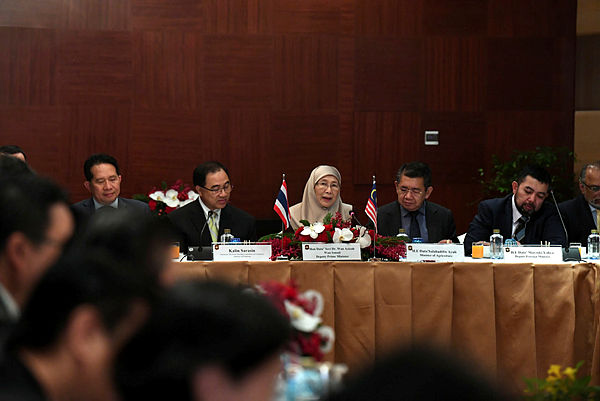BANGKOK: Malaysia and Thailand want to streamline security and improve border connectivity to facilitate movement of goods at the border, said Deputy Prime Minister Datuk Seri Dr Wan Azizah Wan Ismail.
She said the implementation of 24-hour operations at the Bukit Kayu Hitam–Sadao Immigration, Customs, Quarantine and Security (ICQS) facility that will commence on April 1, 2019, showed the commitment of both countries on this issue.
The Malaysian government was also looking at other border development projects that could spur the growth of the states at the border, she said.
“One immediate project that has received approval from the government is the development of a truck depot at the Special Border Economic Zone (SBEZ) in Kota Perdana, Bukit Kayu Hitam. This project is expected to enhance Kedah’s position as a strategic gateway for border trade between Malaysia and Thailand,“ she said at the Joint Standing Committee on Commerce, Industry and Banking (JSCCIB) of Thailand, here today.
Dr Wan Azizah is currently in Bangkok for her two-day official visit to Thailand, which started yesterday.
The deputy prime minister said the meeting with representatives from the Thai business community was timely particularly in view of Thailand being the chair of Asean this year and the 62nd anniversary of the Malaysia-Thailand diplomatic relationship.
“Within the context of Asean, Malaysia and Thailand continue to be strategic partners, notably from an economic standpoint. Being our close neighbour, Thailand is Malaysia’s fifth largest trading partner and the sixth largest export destination.
“In 2017, total trade between Malaysia and Thailand rose 10.3% to US$22.9 billion. For the first 11 months of last year, total trade grew 14.7% year-on-year to US$24.06 billion, on the back of a 20.9% increase in Malaysia’s export to Thailand to US$13.01 billion, and a 8.2% rise in Thailand’s export to Malaysia to US$11.05 billion,“ she said.
She said border trade made up the largest trade transaction between Malaysia and Thailand, at 72% of the total bilateral trade in 2017.
Dr Wan Azizah said the new Malaysian government was in the process of actively reviewing and evaluating the country’s key economic policies, and formulating new policies for the development of the overall economic plan to spearhead national development post 2020.
“Regionally, our Prime Minister Tun Dr Mahathir Mohamad has called on Asean to boost intra-regional trade by up to 30% from the current 20%. This is to provide more opportunities for small and medium-sized enterprises to capitalise on growing investments in the area.
“This message was conveyed clearly during Dr Mahathir’s official working visit to Thailand in October last year, where he encouraged both countries to take full advantage of the bilateral and multilateral engagement initiatives to boost trade, such as the Regional Comprehensive Economic Partnership (RCEP) and the Indonesia-Malaysia-Thailand Growth Triangle (IMT-GT),“ she said.
Meanwhile, during the meeting with the Malaysian diaspora in Thailand, Dr Wan Azizah urged them to join in helping the process of rebuilding Malaysia.
She said that Malaysia, which was now being helmed by a new government under the leadership of Pakatan Harapan, still needed input as a New Malaysia.
“For those in the academic world, the government needs constructive input to develop policies that are more effective, for those having business, make your business organisations as the platform to bring Malaysians from the various races to be united under the various organisations.
“For those skilled in the fields of technology and research, make sure your presence in Thailand would be useful by studying the technologies here which are sophisticated and modern for the possibility of a technology transfer in the relevant sectors,” she added. — Bernama














